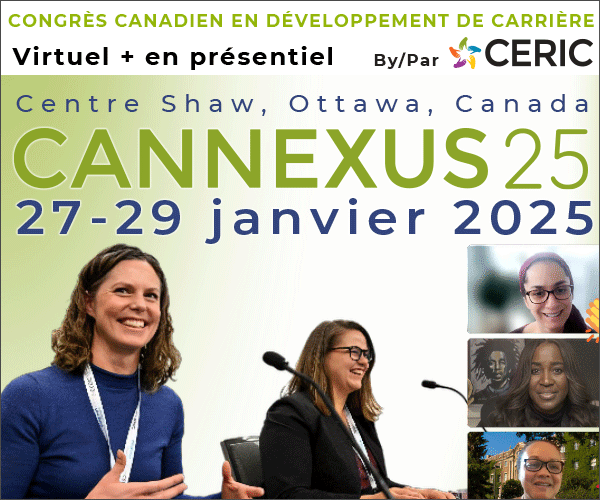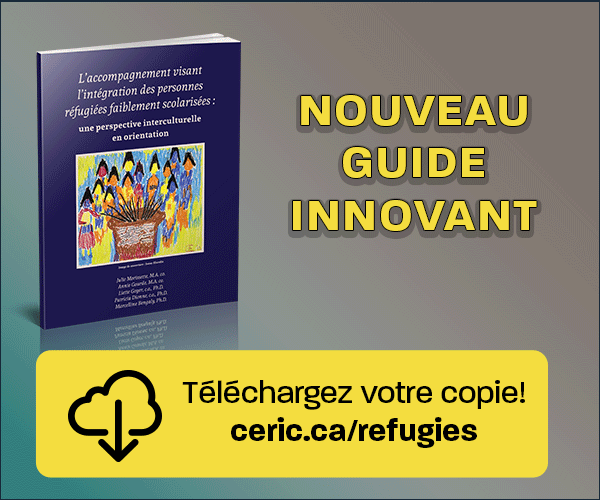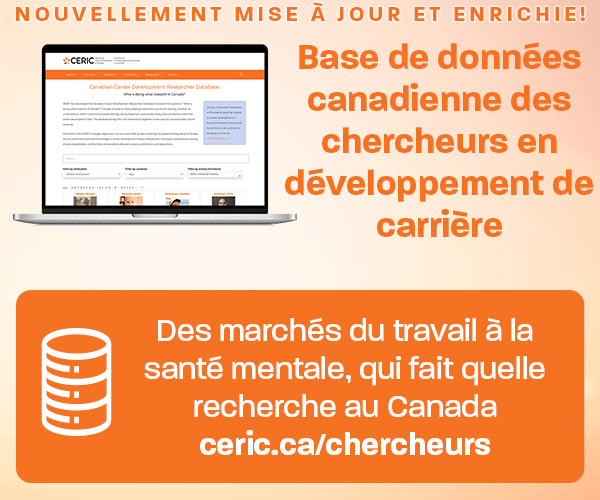L’auto-efficacité professionnelle en tant que médiateur entre l’intelligence émotionnelle et la planification de l’emploi chez les étudiants américains
DOI :
https://doi.org/10.53379/cjcd.2021.85Mots-clés :
Les 5 grands traits de personnalité, l'auto-efficacité du choix de carrière, indécision de carrière, échelle de planification de la carrière des étudiants, l'intelligence émotionnelleRésumé
This study examines the dynamics of personality traits that interfere with occupational decisions among young adults, especially during a pandemic. Three multiple regression analyses were conducted to predict career decision self-efficacy (CDSE), e.g., planning and indecision from the Big 5 personality measures. We hypothesized that EI and personality affect employment conflicts (Study 1), and that CDSE mediates EI and planning difficulty (Study 2). Conscientiousness and openness significantly predicted CDSE, F(5, 128) = 15.64, p < .001, R2 = .38, while neuroticism was statistically significant in predicting CSPS, F(5, 128) = 3.94, p < .01, R2 = .13. Neuroticism was significant for personality variables while a negative correlation was found between EI and career indecision (r = -0.25, at p < .01). Results demonstrate that the positive effect of CDSE mediated EI’s link to career indecision, which reveals that conscientiousness also predicted participants’ occupational indecision (β = -0.17, p < .05).
Références
Ahorsu, D. K., Lin, C-Y., Imani, V., Saffari, M. Griffiths, M. D., Pakpour, A. H. (2020). The fear of COVID-19 scale: Development and initial validation. International Journal of Mental Health and Addiction, 1-9. https://doi.org/10.1007/s11469-020-00270-8
Campagna, C. G., & Curtis, G. J. (2007). So worried I don’t know what to be: Anxiety is associated with increased career indecision and reduced career certainty. Australian Journal of Guidance and Counselling, 17(1), 91-96. https://doi.org/10.1375/ajgc.17.1.91
Chung, Y. B. (2002). Career decision-making self-efficacy and career commitment: Gender and ethnic differences among college students. Journal of Career Development, 28, 277- 284. https://doi.org/10.117 7/089484530202800404
Coetzee, M., & Harry, N. (2014). Emotional intelligence as a predictor of employees’ career adaptability. Journal of Vocational Behavior, 84, 90-97. https://doi.org/10.1016/j.jvb.2013.09.001
Cortina, J. M. (1993). What is coefficient alpha? An examination of theory and applications. Journal of Applied Psychology, 78(1), 98-104. https://doi.org/10.1037/0021-9010.78.1.98
Fabio, A. D., Palazzeschi, L., Levin, N., & Gati, I. (2015). The role of personality in the career decision-making difficulties of Italian young adults. Journal of Career Assessment, 23(2), 281-293. https://doi.org/10.1177/1069072714535031
Falco, L. D., & Summer, J. J. (2019). Comparing ability and self-report trait emotional intelligence, fluid intelligence, and personality traits in career decision. Personality and Individual Differences, 64, 174-178. https://doi.org/10.1177/0894845317721651
Gati, I., Krausz, M., & Osipow, S. H. (1996). A taxonomy of difficulties in career decision making. Journal of Counseling Psychology, 43(4), 510-526. https://doi.org/10.1037/0022-0167.43.4.510
Gottlieb, T., & Gøtzsche-Astrup, O. (2020). Personality and work-related outcomes through the prism of socioanalytic theory: A review of meta-analyses. Nordic Psychology. Advance online publication. https://doi.org/10.1080/19012276.2020.1756902
Gray, M. A., Kim, M., & Lee, S. (2021). Simplifying the measurement of college students’ career planning: the development of career student planning scale during the COVID-19 pandemic. Experimental Results, 2, e4, 1-9. https://doi.org/10.1017/exp.2020.69
Gray, M. A., Lee, S., & Kim, M. (2020). Comparing self-reported emotional intelligence, self- efficacy, and personality traits in college students’ career decision-making: A pilot study. In S. Lee (Ed.), Exploring the opportunities and challenges of college students (pp. 205- 217). NOVA Science Publishers, Inc.
Hair, J. F., Jr., Black, W. C., Babin, B. J., & Anderson, R. E. (2019). Multivariate data analysis (8th ed.). Cengage Learning, EMEA.
Han, S., Kim, K, & Kim, J. (2017). Understanding nomophobia: Structural equation modeling and semantic network analysis of smartphone separation anxiety. Cyberpsychology, Behavior, and Social Networking, 20(7), 419-427. https://doi.org/10.1089.cyber.2017.0113
Işik, E. (2012). The relationship of career decision self-efficacy, trait anxiety, and affectivity among undergraduate students. Psychological Reports: Human Resources & Marketing, 111(3), 805-813. https://doi.org/10.2466/01.09.10.PR0.111.6.805-813
Jiang, Z. (2016). Emotional intelligence and career decision-making self-efficacy: Mediating roles of goal commitment and professional commitment. Journal of Employment Counseling, 53(1), 30-47. https://doi.org/10.1002/joec.12026
John, O. P., & Srivastava, S. (1999). The Big-Five trait taxonomy: History, measurement, and theoretical perspectives. In L. A. Pervin & O. P. John (Eds.), Handbook of personality: theory and research (Vol. 2, pp. 102–138). New York: Guilford Press.
Law, K. S., Wang, C. S., & Song, L. J. (2004). The construct and criterion validity of emotional intelligence and its potential utilities for management studies. Journal of Applied Psychology, 89(3), 483-496. https://doi.org/10.1037/0021-9010.89.3.483
MacCann, C., Jiang, Y., Brown, L. E. R., Double, K. S., Bucich, M., & Minbashian A. (2020). Emotional intelligence predicts academic performance: A meta-analysis. Psychological Bulletin, 146(2), 150-186. http://dx.doi.org/10.1037/bul0000219
Mahmud, M. S., Talukder, M. U., Rahman, S. M. (2020). Does ‘fear of COVID-19’ trigger career anxiety? An empirical investigation considering depression from COVID-19 as a mediator. Journal of Social Psychiatry, 67, 1-11. https://doi.org/10.1177.0020764020935488
Mojgan, F. N., Kadir, R. A., & Soheil, S. (2011). The relationship between state and trait anxiety with career indecision of undergraduate students. International Education Studies, 4(3), 31-35. https://doi.org/10.5539/ies.v4n3p31
Spurk, D., & Straub, C. (2020). Flexible employment relationships and careers in times of the COVID-19 pandemic. Journal of Vocational Behavior, 119, e103435. https://doi.org/10.1016/j.jvb.2020.103435
Taylor, K. M., & Betz, N. E. (1983). Applications of self-efficacy theory to the understanding and treatment of career indecision. Journal of Vocational Behavior, 22(1), 63-81. https://doi.org/10.1016/0001-8791(83)90006-4
Tomaszek, K., Muchacka-Cymerman, A. (2020). Thinking about my existence during COVID-19, I feel anxiety and awe—The mediating role of existential anxiety and life satisfaction on the relationship between PTSD symptoms and post-traumatic growth. International Journal of Environmental Research and Public Health, 17(19), 7062. https://doi.org/10.3390.ijerph17197062
Wilmot, M. P., Wanberg, C. R., Kammeyer-Mueller, J. D., & Ones, D. S. (2019). Extraversion advantages at work: A quantitative review and synthesis of the meta-analytic evidence. Journal of Applied Psychology, 104(12), 1447-1470. https://doi.org/10.1037/apl0000415
Wong, C. S., & Law, K. S. (2002). Wong and Law emotional intelligence scale (WLEIS). [Database record]. APA Psyc Tests. https://doi.org/10.1037/t0798-000

Téléchargements
Publié-e
Comment citer
Numéro
Rubrique
Licence
(c) Tous droits réservés La Revue canadienne de développement de carrière 2021

Cette œuvre est sous licence Creative Commons Attribution - Pas d'Utilisation Commerciale - Pas de Modification 4.0 International.











